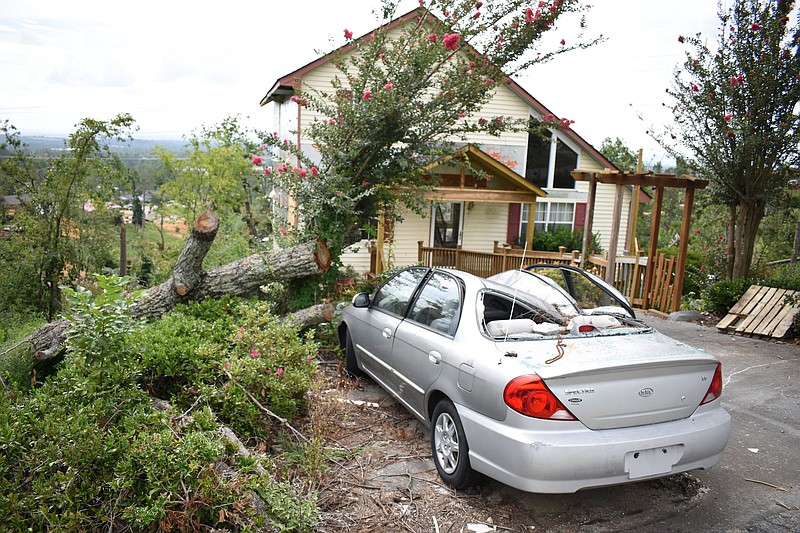No one ever said it was going to be easy, this annual trip around the sun.
For most of Earth's inhabitants, this is a year they'd like to forget. When they flip the calendar to 2021 on Friday, they'd like for all the miseries to be gone, the weather disasters forgotten, the broken rain records obliterated.
It's what we do symbolically every year - starting over, turning over a new leaf. We just didn't know 2020 was one year we never wanted to meet.
Before the year was barely days old, the Centers for Disease Control and Prevention (CDC) - cognizant of a cluster of pneumonia cases associated with a seafood and poultry market - issued a travel notice for Americans going to Wuhan, China.
The U.S., of course, wasn't paying attention because of a political drama playing out in Congress, the impeachment of President Donald Trump by the U.S. House of Representatives for what was, for all intents and purposes, a harmless phone call with the new president of Ukraine the previous summer. One of the subjects of the phone call, Hunter Biden, would be back in the news by the end of the year.
The night before the Senate acquitted Trump of the charges, House Speaker Nancy Pelosi - knowing the president's exoneration was coming - displayed a temper tantrum in full view of the American people, tearing up a copy of his State of the Union message.
The same powerful politician, by the end of the year, was exposed for holding up aid for a beleaguered American public in order to prevent re-election votes for the president, then finally signing a relief bill she could have had more than three months earlier.
By the conclusion of the impeachment drama, the first case of coronavirus had been reported in the United States, the World Health Organization (WHO) had declared the coronavirus a public health emergency and Trump had banned most travel from China.
In mid-March, with the WHO now declaring the coronavirus outbreak a pandemic and world deaths climbing, the stock market fell dramatically, many U.S. businesses shut down to slow the spread of the disease, sports leagues paused and employees of businesses that remained open learned to work at home.
Former Vice President Joe Biden, left for dead by other Democratic candidates in the snows of Iowa and New Hampshire, won the South Carolina primary and went on to his party's presidential nomination, becoming at 77 the oldest candidate ever nominated for the highest office in the land.
In early April, the CDC - once having discouraged the wearing of masks against the coronavirus - said everyone should consider wearing such face coverings in public. With mask mandates, though, people immediately took sides, the freedom of not wearing a mask somehow more important than giving a loved one a deadly disease.
In Chattanooga, Easter evening tornadoes ripped through East Brainerd and North Georgia, killing 10 and causing millions of dollars in damage.
The pandemic raged on through the spring and summer and took on political implications when some public officials who were cautioning people to stay at home on the one hand were on the other encouraging others to protest - which led to anarchy and property destruction in several cities - following the death of a Black man at the hands of white Minneapolis police officers.
While a public discussion of racial justice was overdue, the issue quickly grew out of hand, joined hands with a burgeoning cancel culture and soured millions who otherwise might have been supportive.
By late summer, the quadrennial presidential election was in full swing, with Trump, the right man to grow an economy but the wrong man to shepherd a pandemic, facing the gaffe-prone, baggage-heavy, campaign-shy Biden.
Even as Operation Warp Speed, the public-private partnership announced by the White House to speed up a coronavirus vaccine, moved closer toward success, the president and his wife tested positive for the virus, as would those who berated him for his handling of the pandemic, those who went defiantly maskless, the rich, the poor, office-holders and Hollywood political dilettantes.
Before the year was up, the nation would endure record fires and high temperatures in California, the death of Supreme Court Justice Ruth Bader Ginsberg, a faux demand for presidential mail balloting and even the invasion of domestic bee-threatening murder hornets.
The election itself was fraught with fraud but none that could be shown to come anywhere close to overcoming a 7 million popular vote advantage that Biden amassed. Yet Trump filed lawsuits and sought court actions in efforts to change things that, while his right, nevertheless caused unsophisticated voters to declare democracy was in peril.
Before the end of the year, two signs of hope crept across the horizon - the advent and seeming phenomenal success of virus vaccines and an alignment of planets on the day of the winter solstice that reminded many of a biblical star that once heralded a savior.
As we look to 2021, even though many months remain before the virus can be eradicated and though political turmoil always will be with us, we think of the Bible's promise in Revelation 21:4, which normally presages the second coming of Christ. "And God will wipe away every tear from their eyes," it says. "[T]here shall be no more death, nor sorrow, nor crying. There shall be no more pain, for the former things have passed away."
Happy new year, we trust.
